| Part of a series on the |
 |
|---|
The following is a list of the members of the seventeenth Knesset , elected on 28 March 2006 and inaugurated 4 May 2006, and their replacements.
| Part of a series on the |
 |
|---|
The following is a list of the members of the seventeenth Knesset , elected on 28 March 2006 and inaugurated 4 May 2006, and their replacements.
| Name | Party | Replaced by | Remarks |
|---|---|---|---|
| Uriel Reichman | Kadima | Shai Hermesh | Resigned on 20 April 2006 after the role of Minister of Education, promised to him by Ariel Sharon, was given to Labor. |
| Natan Sharansky | Likud | Haim Katz | Sharansky retired from politics and left the Knesset on 20 November 2006. |
| Yuri Stern | Yisrael Beiteinu | David Rotem | Stern died of cancer on 16 January 2007. |
| Dan Naveh | Likud | Yuli-Yoel Edelstein | Naveh resigned to go into business on 27 February 2007. |
| Azmi Bishara | Balad | Said Nafa | Bishara resigned from the Knesset on 22 April 2007 due to a police investigation into his activities during the 2006 Lebanon War. |
| Shimon Peres | Kadima | Isaac Ben-Israel | Peres resigned from the Knesset following his election as president on 13 June 2007. |
| Shlomo Breznitz | Kadima | Yohanan Plesner | Breznitz retired from politics and left the Knesset on 8 October 2007. |
| Avigdor Yitzhaki | Kadima | Shlomo Molla | Yitzhaki resigned from the Knesset on 7 February 2008 due to "serious doubts over Ehud Olmert's ability to lead the government in the wake of the Winograd Report". [1] |
| Shlomo Benizri | Shas | Mazor Bahaina | Benizri resigned from the Knesset on 27 April 2008 after being convicted of bribery. |
| Efraim Sneh | Labor | Shakhiv Shana'an | Sneh resigned from the Knesset on 28 May 2008 as he left Labor to found his own party. |
| Danny Yatom | Labor | Leon Litinetsky | Yatom resigned from the Knesset on 30 June 2008 due to a lack of confidence in the government. |
| Ya'akov Cohen | United Torah Judaism | Uri Maklev | Cohen resigned from the Knesset due to a rotation agreement. |
| Yossi Beilin | Meretz-Yachad | Tzvia Greenfield | Beilin retired from politics and left the Knesset on 4 November 2008. |
| Avraham Ravitz | United Torah Judaism | Yehoshua Menachem Pollack | Ravitz died on 26 January 2009. |
Liberalism in Israel has played a role since the country's founding.
Meimad is a moderate to left-wing religious Zionist political party in Israel. Founded in 1999, it is based on the ideology of the Meimad movement founded in 1988 by Rabbi Yehuda Amital. It was formed by religious Zionists who supported the peace process and believed the National Religious Party had drifted too far to the right.

Gan Shmuel is a kibbutz in northern Israel. Located in Haifa District, east of Hadera, it falls under the jurisdiction of Menashe Regional Council. In 2022 it had a population of 964. The kibbutz was named after Rabbi Shmuel Mohilever.
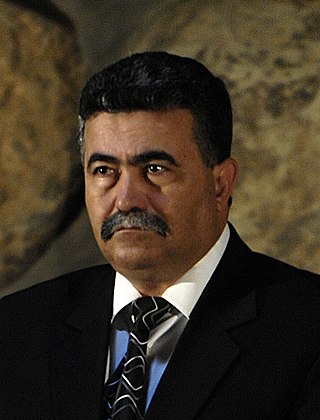
Amir Peretz is an Israeli politician who served as a member of the Knesset for the Labor Party. A Knesset member almost continuously from 1988 to 2021, he has served as Minister of Defence, Minister of Economy, and Minister of Environmental Protection, as well as heading the Histadrut trade union federation between 1995 and 2006.
Elections for the 17th Knesset were held in Israel on 28 March 2006. The voting resulted in a plurality of seats for the then-new Kadima party, followed by the Labor Party, and a major loss for the Likud party.
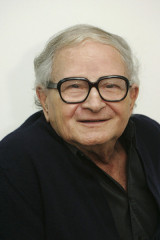
Dor, known as Gil until 2012, is a centrist political party in Israel and was part of the governing coalition in the seventeenth Knesset. In the 2009 elections, Gil did not receive sufficient votes for representation in the Knesset. In preparation for the 2013 elections, the party was renamed Dor.
Justice for the Elderly was a political faction in Israel between June and October 2008. Led by Moshe Sharoni, it had three seats in the Knesset.
Moshe Sharoni was an Israeli politician who served as a member of the Knesset for Gil between 2006 and 2009. He previously served as head of the breakaway faction, Justice for the Elderly.
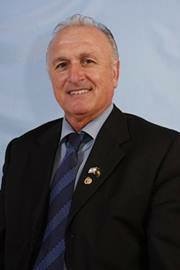
Elhanan Glazer is an Israeli politician. He served as a member of the Knesset for Gil, Justice for the Elderly and The Right Way between 2006 and 2009.
Sarah Marom-Shalev is an Israeli politician who served as a member of the Knesset for Gil between 2006 and 2009.

Legislative elections were held in Israel on 10 February 2009 to elect the 120 members of the eighteenth Knesset. These elections became necessary due to the resignation of Prime Minister Ehud Olmert as leader of the Kadima party, and the failure of his successor, Tzipi Livni, to form a coalition government. Had Olmert remained in office or had Livni formed a coalition government, the elections would have been scheduled for 2010 instead.
The Right Way was a Knesset faction in Israel. Its sole member was Elhanan Glazer.
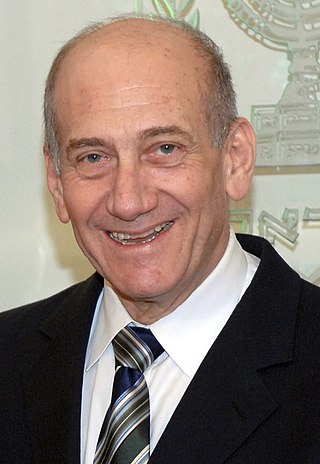
The thirty-first government of Israel was formed by Ehud Olmert on 4 May 2006, following Kadima's victory in the March elections. His coalition initially included Labor, Shas and Gil, and held 67 of the 120 seats in the Knesset. The 11-seat Yisrael Beiteinu joined the coalition in November 2006, but left on 16 January 2008 in protest at peace talks with the Palestinian National Authority. With the inclusion of the Labor Party's Raleb Majadele as a Minister without Portfolio on 29 January 2007, it became the first Israeli cabinet to have a Muslim minister. The makeup of the coalition resulted in a center-left government.
Hatnua was a liberal political party in Israel formed by former Israeli Foreign Minister and Vice Prime Minister Tzipi Livni to present an alternative to voters frustrated by the stalemate in the Israeli–Palestinian peace process.
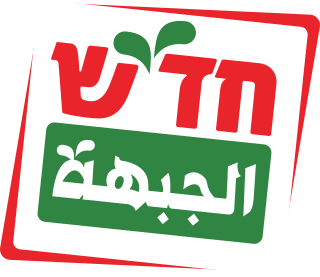
Hadash (Hebrew: חד״ש, abbreviation for HaHazit HaDemokratit LeShalom VeLeShivion is a left-wing to far-left political coalition in Israel formed by the Israeli Communist Party and other leftist groups.
Politics in Israel are dominated by Zionist parties. They traditionally fall into three camps, the first two being the largest: Labor Zionism, revisionist Zionism, and religious Zionism. There are also several non-Zionist Orthodox religious parties and non-Zionist secular left-wing groups, as well as non-Zionist and anti-Zionist Israeli Arab parties.

Meretz was a left-wing political party in Israel. The party was formed in 1992 by the merger of Ratz, Mapam and Shinui, and was at its peak between 1992 and 1996 when it had 12 seats. It had no seats in the Knesset following its failure to pass the electoral threshold in the 2022 elections, the only time it failed to win seats in the Knesset.
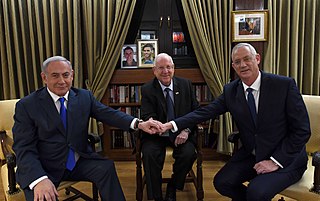
The thirty-fifth government of Israel, or the Netanyahu–Gantz government, was the government of Israel which was sworn in on 17 May 2020 and dissolved on 13 June 2021.
Snap legislative elections were held in Israel on 17 September 2019 to elect the 120 members of the 22nd Knesset. Following the previous elections in April, incumbent Prime Minister Benjamin Netanyahu failed to form a governing coalition. On 30 May, the Knesset voted to dissolve itself and trigger new elections, in order to prevent Blue and White party leader Benny Gantz from being appointed Prime Minister-designate. This election marked the first time the Knesset voted to dissolve itself before a government had been formed.
Legislative elections were held in Israel on 23 March 2021 to elect the 120 members of the 24th Knesset. It was the fourth Knesset election in two years, amidst the continued political deadlock following the previous three elections in April 2019, September 2019 and 2020. Yair Lapid and Naftali Bennett announced that they had formed a rotation government on 2 June 2021, which was approved on 13 June 2021.